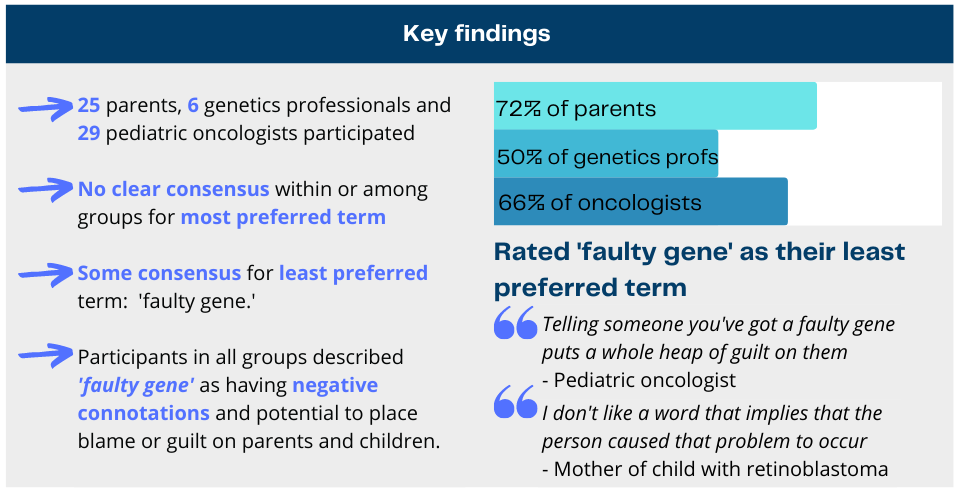Background:
Clear and effective communication between clinicians and families is essential for productive and informative discussions. This is particularly important in complicated fields like cancer genetics. As the field of cancer genetics advances, so too does the terminology used in the field. Terms that were once acceptable can over time develop negative connotations or imprecise meanings to patients and their families. An example of this includes the term ‘mutation,’ previously used by clinicians and researchers to describe a patient with a disease-causing change in a cancer gene. In recent years, this term has become associated with science fiction in popular culture and disease and radiation damage in scientific literature, creating increasingly negative public perceptions. Research suggests this term is now widely misunderstood and may have negative psychosocial impacts for patients and families. Yet there are no current guidelines or literature which have identified the most appropriate term to describe a disease-causing change in a cancer gene to patients and families in the childhood cancer setting. Currently available guidelines also rarely address preferences of patients and families. For a field that is rapidly evolving, scientifically complex, and sometimes misunderstood, incorporating patient preferences is essential for best practice in clinical genetics.
Our study:
Our study aimed to identify the most appropriate term to describe a disease-causing change in a cancer gene with patients and families in the childhood cancer setting. To do this, we interviewed 25 parents with a child with cancer, 29 pediatric oncologists and 6 genetics health professionals. We asked them what their most and least preferred term from a list of four options: ‘faulty gene,’ ‘altered gene,’ ‘gene change,’ and ‘genetic variant.’ We also asked participants to describe their reasons for their preferences.
Our findings:
Overall, we found no clear consensus within or among our participant groups for the most preferred term. However, parents more commonly preferred terms they perceived as neutral. Regarding least preferred terms, there was some agreement among groups with most parents, pediatric oncologists, and half of the genetics professionals least preferring ‘faulty gene.’ Participants across all groups described faulty gene’ as having negative connotations and potentially placing blame or guilt on parents and children. Health professionals described challenges associated with balancing emotional impacts with scientific accuracy and understanding when delivering genetic findings to families.
This the first study to investigate multiple stakeholders’ perspectives regarding terminology to describe a cancer-related disease-causing variant in the childhood cancer setting, providing valuable qualitative insight. Our findings may have direct practice implications for genetic counselors, clinical geneticists and pediatric oncologists, suggesting that ‘faulty gene’ may have attracted negative connotations for parents of children with cancer and may no longer be appropriate to use in patient/family discussion about genetic findings. Lack of consensus in our study highlights the need for healthcare professionals to be guided by families’ preferred terminology in their discussions, while providing accurate explanations regarding implications of genetic findings. These findings may also have relevance beyond childhood cancer, such as in the rare genetic diseases space, as highlighted by engagement with this research from health professionals across a number of disciplines on Twitter.
Click here to read the full article.

 RSS Feed
RSS Feed